by Lisa Cooke | Mar 7, 2013 | 01 What's New, Conferences
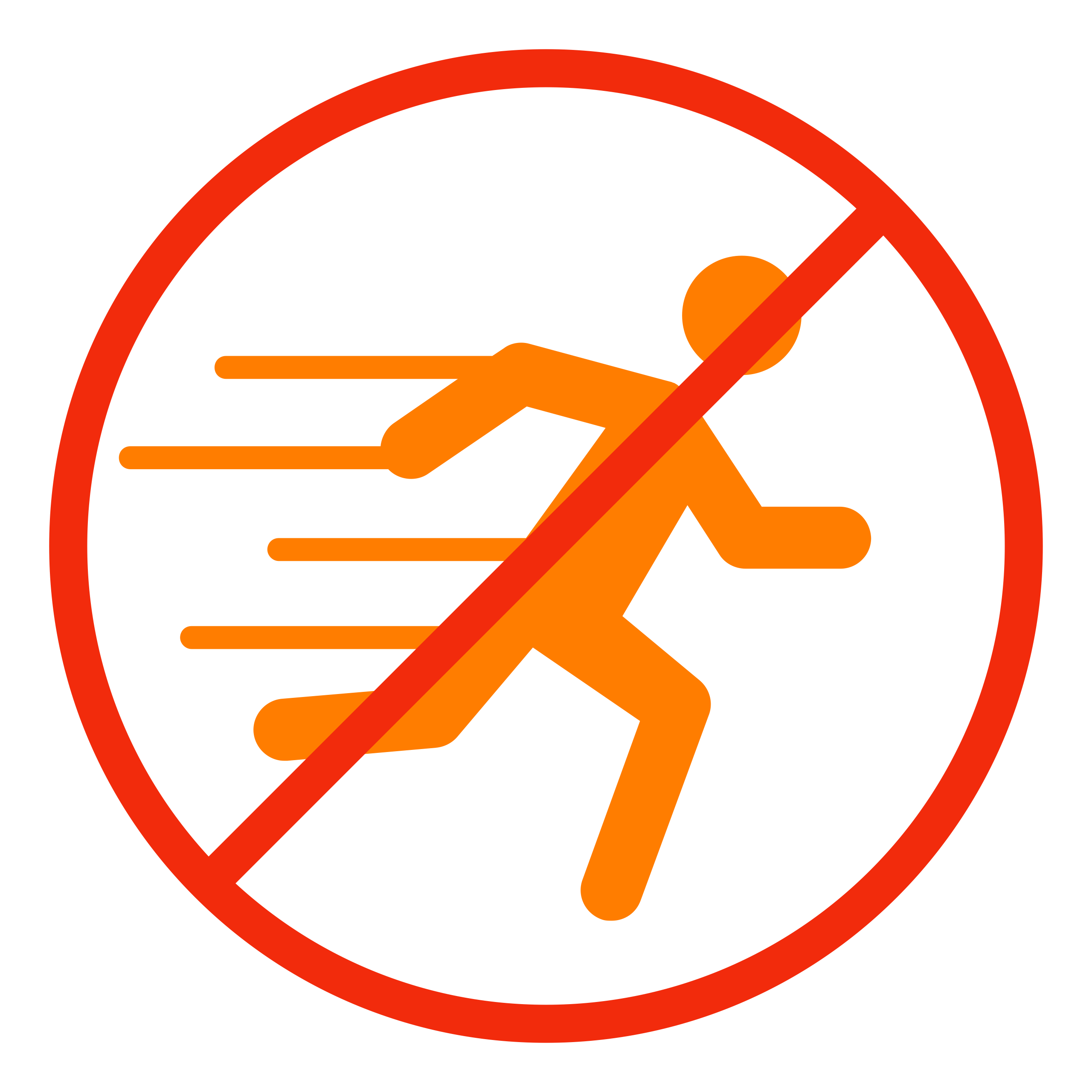 This spring we’ve got some great conferences coming up in the U.S., like #RootsTech2013 in Salt Lake and the National Genealogical Society conference in Las Vegas, as well as events in Fairfax (VA), Wausau (WI), Manchester (NH), Cincinnati (OH), the Houston area, and Southern California. So here’s my question, just for fun: where do you sit when you go to conferences?
This spring we’ve got some great conferences coming up in the U.S., like #RootsTech2013 in Salt Lake and the National Genealogical Society conference in Las Vegas, as well as events in Fairfax (VA), Wausau (WI), Manchester (NH), Cincinnati (OH), the Houston area, and Southern California. So here’s my question, just for fun: where do you sit when you go to conferences?
Studies of college classrooms show that students who sit toward the front of the room and catch the teacher’s eye are more likely to pay attention, which can translate into a better learning experience. Now, that caught my eye, because a better learning experience is what we all want out of conferences.
The report goes on to say that students who sit in front and make eye contact establish a better rapport with teachers and are more likely to be more engaged in the learning process. Of course, a conference isn’t the same as a college class. The instructor isn’t grading you. But presenters are human too, and they appreciate an engaged audience. In any sort of presentation, there is always an energy that flows back and forth between audience and presenter. Both you and the instructor will benefit from rapport and engagement.
Here are my tips for getting the most out of your experience:
- Arrive at the lecture as early as possible so you can get a seat where you’ll be able to see and hear everything clearly.
- Read the class syllabus ahead of time so you’ll be familiar with the material going into the presentation.
- Print out the syllabus (or have it handy on your iPad or tablet) so you don’t waste time writing down ideas and links that have already been written for you.
- Keep your attention on the speaker, but jot down any additional ideas the speaker shares that aren’t in the syllabus–as well as any ideas you hope to apply to your own research.
Here’s a final tip that comes from the study report on where you sit. One interviewee for this article says that, “In lecture, students’ attention tends to bottom out about 30 minutes into class, which is just when faculty are getting to the most important information.” She goes on to say that sitting closer to the instructor will help you stay focused during that critical time. The takeaway: 30 minutes into any lecture, if your attention starts to wander, challenge yourself to write down the key concept you learned up to that point, and one key question you hope will be answered. And then re-focus on listening intently for the answer.
Check out my upcoming live presentations. See you in class!
by Lisa Cooke | Feb 10, 2020 | 01 What's New, Book Club |
After a long day of genealogical research, what could be more satisfying than curling up with a good book about genealogical research?! Nathan Dylan Goodwin’s new book The Sterling Affair promises a satisfying return journey into the life of forensic genealogist Morton Farrier.
(This article includes affiliate links. If you decide to pick up a copy of this book, using our links for which we will be compensated by the book seller helps support our ability to bring author Q&A’s like this to your screen. Thank you!)
Click here to purchase your copy of The Sterling Affair

The Sterling Affair by Nathan Dylan Goodwin
Goodwin sets the scene of his new book as follows:
“When an unannounced stranger comes calling at Morton Farrier’s front door, he finds himself faced with the most intriguing and confounding case of his career to-date as a forensic genealogist. He agrees to accept the contract to identify a man who had been secretly living under the name of his new client’s long-deceased brother.
Morton must use his range of resources and research skills to help him deconstruct this mysterious man’s life, ultimately leading him back into the murky world of 1950s international affairs of state.”
A Conversation with Author Nathan Dylan Goodwin
Don’t worry, we won’t be spoiling the exciting read you have ahead of you. Today I will be chatting with Nathan about his life as an author, his writing process, and how the main character, Morton Farrier, almost didn’t make it past the first book!
Lisa Louise Cooke: The Sterling Affair is your eighth novel in the Morton Farrier genealogical crime mystery series. When you first began writing the series did you imagine an eighth book? And today can you imagine even more?
Nathan: I literally had no concept that there would be so many books in the series! At first, it was written as a one-off, then I started to have ideas for two or three more.
I think when I wrote book three, The Orange Lilies, I knew that the series had plenty more scope, especially as DNA-testing was just beginning for genealogists, opening up a whole new world of potential storylines! As to the future of the series, I’m currently plotting books nine and ten. I don’t see an end to the series just yet!

Click the book image to order your copy.
Lisa Louise Cooke: I heard you speak at THE Genealogy Show conference in Birmingham England in 2019. In that presentation you told the audience that you almost killed off Morton at the end of the first book. I imagine you’re glad now that he survived. What exactly happened back then?
Nathan: Killing Morton would have been the most stupid thing I could have done!
I started writing Hiding the Past (the first book in the series) as part of my studies for a Master’s Degree in creative writing and I think I’d been reading a novel at the time, which went along the lines of ‘if you’re reading this then I’m dead’. I thought this angle might work for the first draft of my story but thankfully, as the book progressed, I was able to see several plotlines, which could continue into further stories.
I knew from the outset that I wanted the main character, Morton Farrier, to have been adopted and be totally unaware of his biological family, so there was plenty of scope there to continue that subplot in future books.
Lisa Louise Cooke: How has the advent of DNA testing changed the course of your writing?
Nathan: DNA-testing has completely changed the course of my writing—in a good way, I like to think! There are now so many more possibilities for Morton to solve his cases in different ways.
Morton took an Ancestry DNA test back in 2014 when it had not yet even become possible in the UK. He did what I had to do, which was to order one in the US and have a friend ship it over, then post it back to the US for testing and analysis!
From that point onwards, DNA has played an ever-increasing role in helping Morton to solve his cases. In the most recent book, The Sterling Affair, Morton uses a variety of real tools and websites which are familiar to genealogists.
Lisa Louise Cooke: When you start a book like The Sterling Affair, do you already have it well mapped out, or are there surprises even for you along the way as to the path it will take?
Nathan: I usually spend at least three months conducting research for the books. This involves reading, visiting record offices, libraries, churches, etc. Basically, anything which Morton does in the book, I do first.
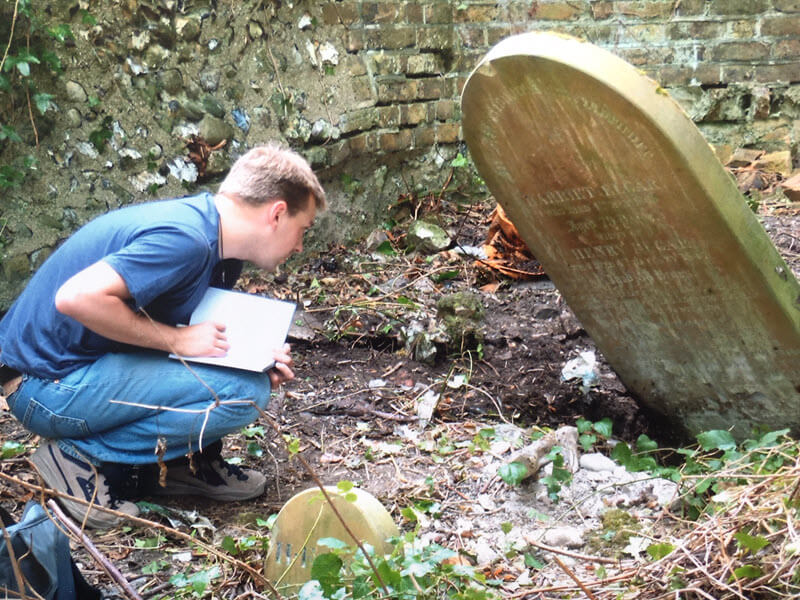
Photo courtesy of Nathan Dylan Goodwin
At the point when I actually start writing I probably have about 60% of the storyline mapped out. It’s a big cliché to say so, but for me the characters really do come to life and do things which I hadn’t anticipated. For the first few books I found it a little unnerving to be starting to write something that I didn’t know pretty well 100% what was going to happen, but now I trust myself and I know I’ll get to the end if I let the characters lead the way!
Lisa Louise Cooke: Where do you get your inspiration for the story lines in your books?
Nathan: My ideas come from a variety of sources, but never by actively searching for the next story; I just seem to stumble on a nugget of an idea, which I think could make for an interesting genealogical crime mystery and make a note of it! It can be a news story involving history or genealogy in some way, something I’ve picked up from a family history publication, or a Facebook group where people share their own genealogical mysteries.
Increasingly, the books have more real-life characters, plotlines and locations. For example, The Spyglass File, which is set on the frontline of Kent during the Battle of Britain, was loosely based on my grandmother’s story, whereby she gave birth to an illegitimate child in 1943, whom she put up for adoption whilst my grandfather was a POW in Thailand.

Nathan’s Grandmother – Photo courtesy of Nathan Dylan Goodwin.
The Sterling Affair is based on nefarious goings-on during the 1950s and involves real undercover MI6 operations and real spies. The idea for this story came from the National Archives newsletter, which mentioned the release of some previously closed MI6 records. This got me thinking about someone trying to conceal their real identity and Morton having to use his skills to work out who he might be!
Lisa Louise Cooke: For those new to your books, they will see that this is the eighth novel in the series and wonder if it’s too late to join in. Can the book be read and enjoyed as a stand-alone novel?
Nathan: I always say that the books can be read as a stand-alone, but you would be missing out on Morton’s backstory. However, with The Sterling Affair there is not too much given away about his own past, so, of all of the stories, this is the most readable out of sequence!
Lisa Louise Cooke: When you’re not writing about Morton Farrier, what is your favorite way to spend free time?
Nathan: I’m not sure what you mean by ‘free time’!? Obviously, I spend a lot of time on genealogy. I’ve been researching my own family for thirty years now and I feel very fortunate to be able to combine my two loves of writing and genealogy. Aside from that, I enjoy reading, running, skiing, theatre and spending time with my family, friends and dog.
Lisa Louise Cooke: You’re a man of many talents. Do you have other “wishlist” projects you yearn to do in addition to writing?
Nathan: I enjoy photography and would like to develop that at some point in the future and I really would like to take a watercolour painting class at some point. I just need some of that free time you mentioned!

A man of many talents – Photography by Nathan Dylan Goodwin
Lisa Louise Cooke: I’ll be at RootsTech again this year. Will we see you there?
Nathan: I shall have a booth at RootsTech SLC this year signing books and also at THE Genealogy Show in Birmingham once again. So people can come and say hello and let me know what they think of my stories. I love chatting with my readers!
Hear More from Nathan Dylan Goodwin
Read and hear more from genealogical author Nathan Dylan Goodwin in the following exclusive Genealogy Gems content:
- Genealogy Gems Podcast episode 180 features an Interview with Nathan Dylan Goodwin author of The Lost Ancestor.
- Genealogy Gems Podcast episode 179 features a discussion of The Lost Ancestor by Nathan Dylan Goodwin.
- Interview with Nathan Dylan Goodwin: Genealogy Gems Book Club – In this article from 2015 Nathan discusses the second book in the Morton Farrier series, The Lost Ancestor.
- Listen to the full-length Genealogy Gems Book Club interview with Nathan Dylan Goodwin, as he discusses The Lost Ancestor (The Forensic Genealogist) in Genealogy Gems Premium Podcast episode 125 (exclusive for Genealogy Gems Premium Members.)
- Listen to our interview with Nathan Dylan Goodwin about his The Wicked Trade and The Suffragette’s Secret in Genealogy Gems Premium Podcast episode 159 (exclusive for Genealogy Gems Premium Members.
Catch up on the Morton Farrier
Learn more about the entire book series featuring Morton Farrier here in this Genealogy Gems Book Club article.
by Lisa Cooke | Mar 6, 2013 | 01 What's New, British, History, Immigration, Records & databases
If you have British roots, you’ll want to check out the new collection available on Findmypast.com: a half million criminal records dating from 1770-1934!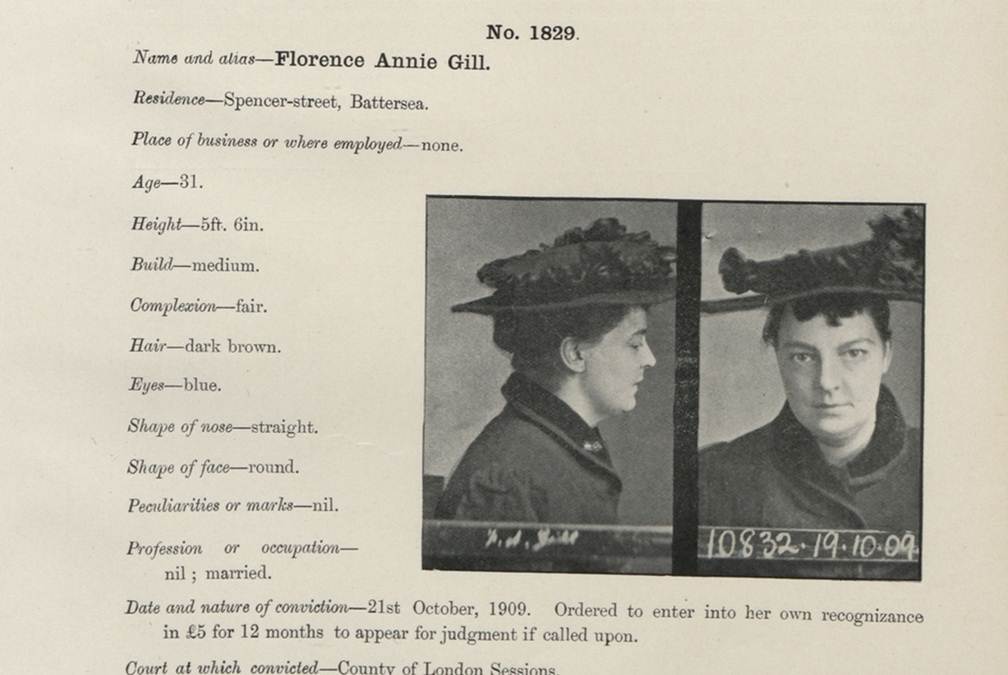
This sounds like a pretty gripping collection, whether you’ve got British roots or not. It contains records like mug shots, court documents, appeals letters and registers from prison ships (which were used when mainland prisons were crowded). According to Findmypast.com, the records “provide a wide variety of color, detail and fascinating social history, chronicling the fate of criminals ranging from fraudsters, counterfeiters, thieves and murderers and their victims.” The 500,000 records you can search now are only a fifth of the full collection of 2.5 million that will be online soon.
The company calls this the largest collection of historical criminal records from England and Wales to be published online and is done in association with the National Archives (UK). Findmypast.com members can click here to access the criminal collection directly (make sure the box for “Institutes and Organizations” is checked).
Here’s a little more background on connections between British convicts and the U.S. and Australia….
During colonial times, Britain often punished criminals by forcing them to emigrate. The most famous destination was Australia: the first British settlement on that continent in 1787 was actually a penal colony. Australia celebrates that fact about its heritage today: learn more about the “First Fleet’s” arrival here.
Up to about 50,000 British convicts were also forced to emigrate to the American colonies during the 1700s. These included prisoners of war from Ireland and Scotland. Read more about this in Bound for America: The Transportation of British Convicts to the Colonies, 1718-1775 (Clarendon Paperbacks) by A. Roger Ekirch. Findmypast.com isn’t able to tell us yet how many records in the criminal collection relate to forced emigrations, but anyone with roots in the U.K. should check out this collection for sure.
by A. Roger Ekirch. Findmypast.com isn’t able to tell us yet how many records in the criminal collection relate to forced emigrations, but anyone with roots in the U.K. should check out this collection for sure.
by Lisa Cooke | Nov 22, 2013
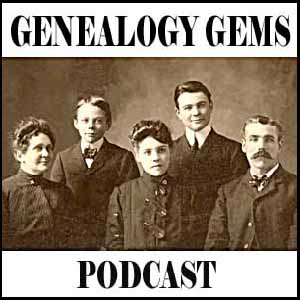 Genealogy Gems Podcast Episodes
Genealogy Gems Podcast Episodes
2013 – 2014 Season Nine
Episode 161
I was so impresssed with Yngve Nedrebø, the Chief archivist at Riksarkivet (National Archives of Norway) who I recently interviewed for the Family Tree Magazine podcast that I’m publishing an extended version of that interview here on the Genealogy Gems Podcast. This is a “must hear” for those with Norwegian heritage. In this episode you’ll also hear from a fellow listener and get a chance to see his family history tour that he created in Google Earth using the techniques I teach in the Google Earth for Genealogy video CD series. And we’ll get a taste of the history of coffee.
Keywords: Norway, Norwegian, Google Earth, Family History Tour, Death Certificate, Coffee
Episode 162
Wondering how to get your kids and grandkids engaged in family history? Looking for worthwhile activities for the kids over the Christmas break? In this episode author Janet Hovorka provides answers. Our children are the future of our families, and there’s no better time to help them engage, explore and enjoy their family history! Special Guest: Janet Hovorka.
App Users: Be sure to check out the audio Bonus Content in the Genealogy Gems App!
Keywords: Kids, Grandkids, Zap the Grandma Gap, Contest Winner, Blog, Pinterest
Episode 163
Get ready to flip out with me over Flipboard. It’s a free app and web tool that you have to see to fully appreciate. In this episode I’ll take you behind the scenes at Flipboard in the Silicon Valley and talk to the folks who create the product that helps you enjoy the online content you love. I’ll also share a little discovery I made about family history when I threw my back out over the holidays (there’s got to be an easier and less painful way to do family history research!) and get you up to date on all the genealogy news.
Keywords: Flipboard, Pinterest, Rootstech, Family Health History, Magazine
Episode 164
In this episode you’ll hear what you’ve been missing and how to get it from the Ancestry Wiki. Also how to do a very specialized type of Google search you may have never tried, a French-Canadian genealogy resource, a living relative dilemma, and much more.
Keywords: Ancestry Wiki, Google Earth, Top 10 List, French Canadian, Purple Heart Video, Jamboree, DNA Swapped, BillionGraves, Evernote
Episode 165
A Blast from the Past: Revisit the remastered episode 13 (recorded back in 2007) which features World War II Service Records, and how to create a Family History Book your non-genealogist relatives will actually read.
Keywords: Print on Demand, Writing, Military
Episode 166
This episode is loaded with genealogy news, ideas, and tips. We focus on you, the listeners, and here some incredible stories of genealogical success!
Episode 167
Colonial American Genealogy with Beth Foulk. Also new online newspaper collections, NGS 2014 wrap up, and why you do research your family history.
Episode 168
This episode is all about DNA. First we’ll discuss Ancestry’s closure of some of their DNA tests, and then you’ll meet Your DNA Guide, Diahan Southard, a new regular contributor to Genealogy Gems.
Episode 169
Catch a glimpse of the silent movie era and how it was an integral part of your ancestors’ lives. In this episode, I find out more about the silent movies my grandmother cataloged in her diary, and how they molded a generation. Interview with Film Historian Sam Gill of the Niles Essanay Silent Film Museum.
Episode 170
Lisa Kudrow, Executive Producer of the TLC television show Who Do You Think You Are? is back to the podcast for another visit. Lisa shares her enthusiasm and feelings about the show, and her hope for its future. Also in this episode, Lisa Louise Cooke shares some incredible successes she’s experienced in her own family history journey lately.
Episode 171
Storyteller Ron Ploof discussed Project Lizzie, and sharing your family history stories with others. Other topics: A strategy for coping and excelling in the face of technological change, Online Seniors and a bit of reminiscing about party lines, a new feature for finding the genealogy topics you need at Genealogy Gems, A newspaper research tip that pays off big, family history jewelry, and the history of the first U.S. federal loan.
Episode 172
The official launch of the exciting news Genealogy Gems Book Club, a cool free online map tool British research, Google Translate, stories of inspirational finds, DNA for genealogy, and a Star Trek take on the innovations of yesteryear!
Episode 173
We all need a little inspiration now and then, and in this episode I’ll bring you some inspiring books to read, motivating comments from other listeners, and some new ideas to try. And a report on using Autosomal DNA for genealogy.
Episode 174
In this episode I’m going to share a personal story from my own family history just recently uncovered, and pull from it 3 powerful strategies that you can start using right away to further your own genealogy research in newspapers. We will also hear from author Emma Brockes in our Book Club, and Your DNA Guide will be here to explain the latest updates at AncestryDNA.
by Lisa Cooke | Apr 9, 2013 | 01 What's New, History, Military, NARA, Records & databases
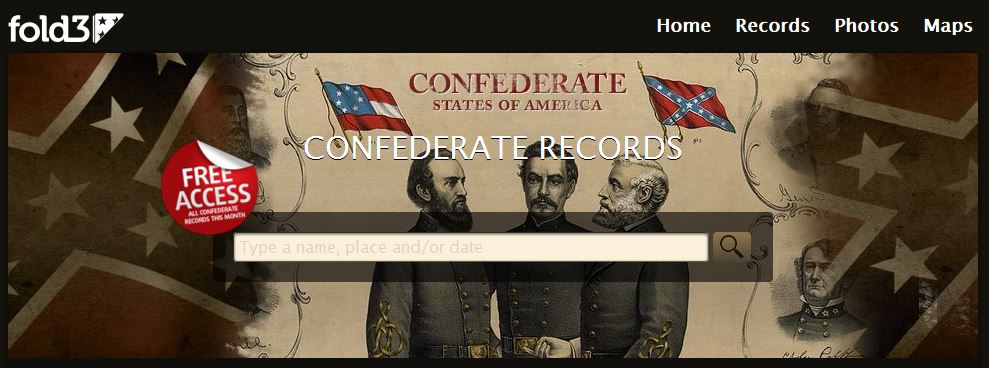
For the month of April, Fold3 is offering free access to its Confederate Civil War collections of more than 19 million records. Many of these are from the National Archives’ War Department Collection of Confederate Records: Confederate Compiled Service Records, Confederate citizens’ files and Confederate Casualty Reports. Whether you’re looking for specific Confederate Civil War soldiers or you’re just interested in history, these records are fascinating!
For example, there are compiled service records for “Galvanized Yankees,” or Confederate prisoners-of-war who obtained a release by enlisting in the Union army. Many of these files have the soldier’s declaration of “Volunteer Enlistment” and an oath of allegiance to the United States. You have to wonder what each man was thinking and feeling as he signed these papers. How did his Union enlistment go? How did his family and community react? If he survived the war, how was his life afterward affected by that choice? There are stories behind every record–and Civil War records are some of the most compelling.
You’ll also find other interesting records in this collection, many created post-war: the Confederate Amnesty Papers, Confederate Navy Subject File, papers relating to the Civil War Subversion Investigations, and files of the Southern Claims Commission.
 This spring we’ve got some great conferences coming up in the U.S., like #RootsTech2013 in Salt Lake and the National Genealogical Society conference in Las Vegas, as well as events in Fairfax (VA), Wausau (WI), Manchester (NH), Cincinnati (OH), the Houston area, and Southern California. So here’s my question, just for fun: where do you sit when you go to conferences?
This spring we’ve got some great conferences coming up in the U.S., like #RootsTech2013 in Salt Lake and the National Genealogical Society conference in Las Vegas, as well as events in Fairfax (VA), Wausau (WI), Manchester (NH), Cincinnati (OH), the Houston area, and Southern California. So here’s my question, just for fun: where do you sit when you go to conferences?







